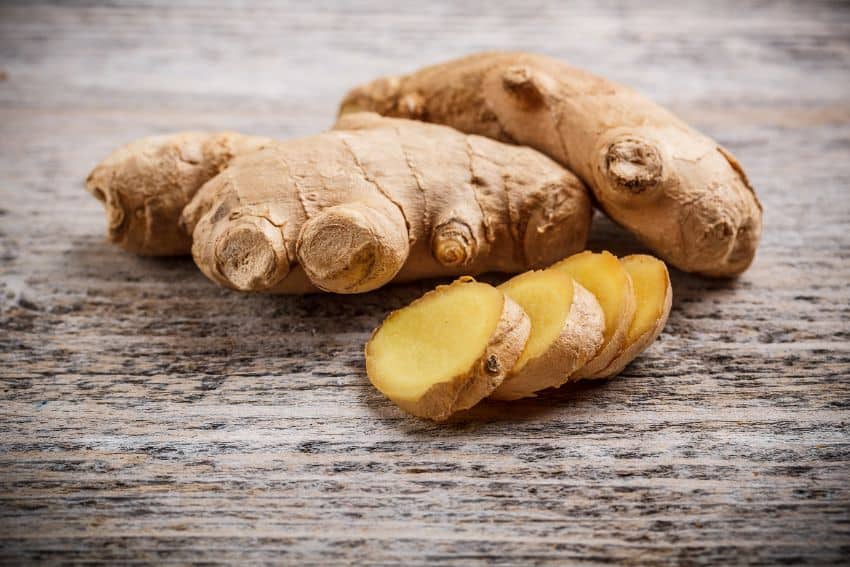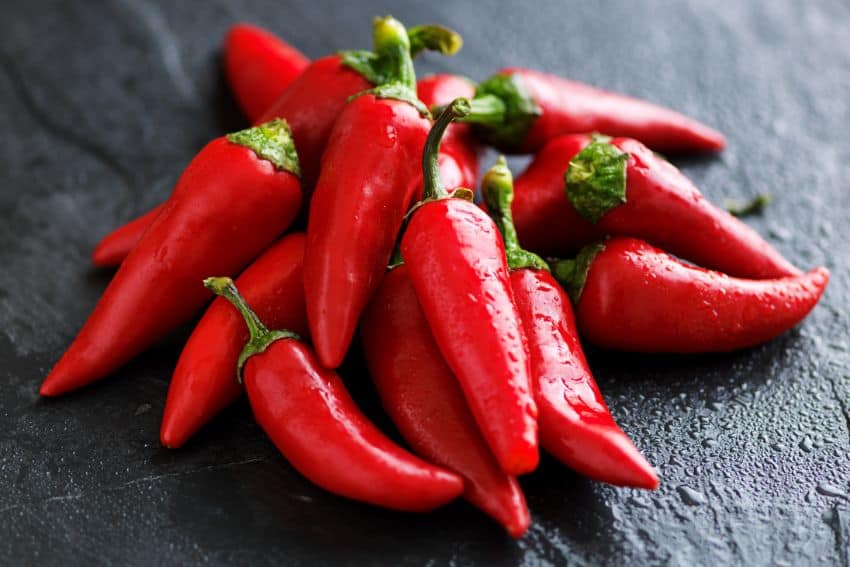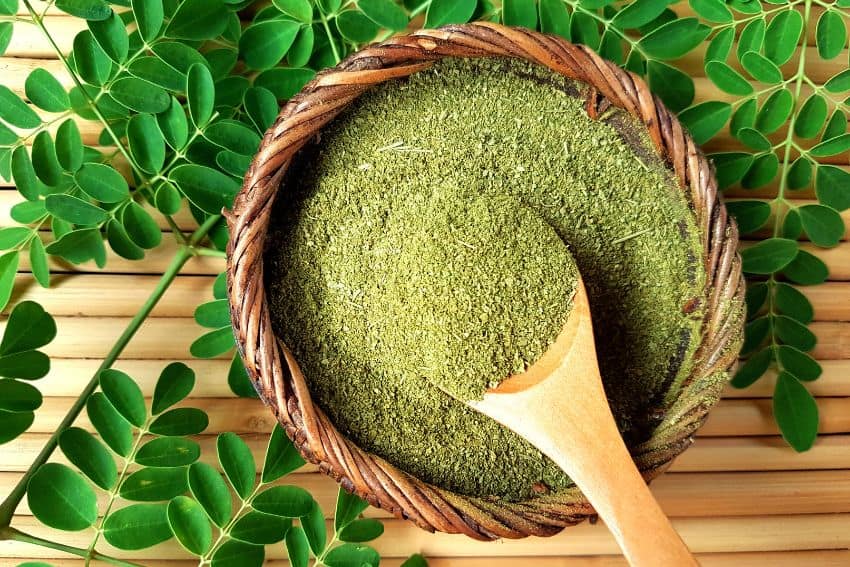Ginger has always been a unique spice. Working both as a zesty kick to both savory and sweet recipes, as well as a medicine for many centuries, ginger is an essential component in Asian, African, and even some European cuisines.
Its nutritional value coupled with its earthy and pungent zing brings life to any dish it’s added to. However, you might find yourself without any ginger right when you are craving ginger tea on a winter morning.
Instead of rolling back into bed disheartened, you can look around your pantry for these 17 substitutes for ginger that will surely do the trick!
Outline
17 Best Substitutes for Ginger
1. Ground Ginger
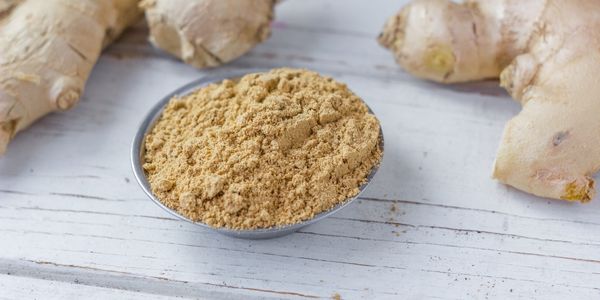
When it comes to the most ideal substitute for fresh ginger in terms of flavor, ground ginger is hard to beat.
Since it is dehydrated ginger which is then turned into a powder, ground ginger shares the same flavor as fresh ginger, except it is even more potent. You only need a fraction of the amount of ground ginger to emulate the same heat and earthiness.
With that said, however, ground ginger is not as complex, and has an overall milder kick when compared to fresh ginger. Ground ginger mixes evenly into any batter or sauce you put it into.
How to Substitute:
⅛ – ½ teaspoon of ground ginger can replace one tablespoon of fresh ginger, depending on the age of the ground ginger.
2. Candied Ginger
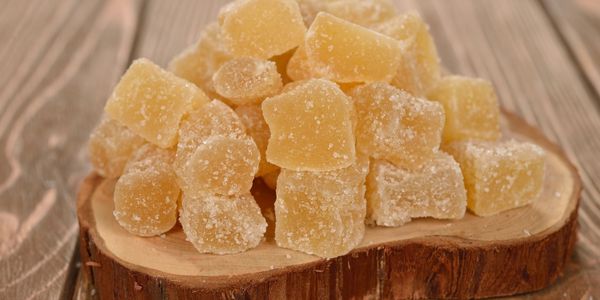
Candied ginger, or crystallized ginger, are pieces of fresh ginger boiled in sugar water and rolled in sugar.
As expected, this form of ginger has a significant sweet kick to it. If you want an earthy kick to your desserts, chop them up into large or fine pieces, and garnish them on top.
They might not be suitable for savory dishes, however, owing to the sweetness as well as the amount needed to substitute for fresh ginger.
How to Substitute:
3 tablespoons of the crystallized finger can substitute for 1 tablespoon of fresh ginger.
3. Frozen Ginger
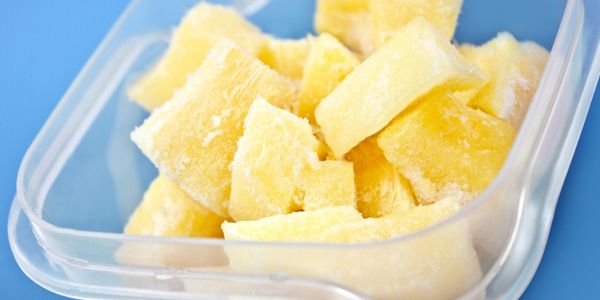
As the name suggests, frozen ginger is a fresh ginger root that has been kept frozen for the purpose of preservation.
Fresh ginger freezes readily. You simply need to keep it in an airtight bag and put it in your freezer for future use. Depending on how you use it, you might not need to wait for it to thaw at all!
If you want to grate your ginger, use it as is. If you want to slice the ginger, wait for it to thaw.
How to Substitute:
Frozen ginger can substitute for fresh ginger in a 1:1 ratio.
4. Pickled Ginger
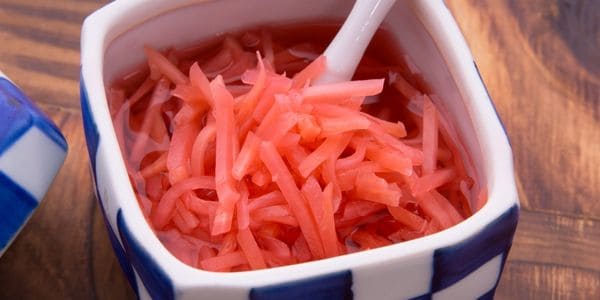
Referred to as gari, pickled ginger is a common companion to sushi and many Japanese dishes.
Both sweet and sour in flavor, pickled ginger helps cleanse the palette and enhance the flavor of any savory dish you have after it.
Given its briny flavor profile, it is unlikely you can add it directly to your recipe. But if you’re in a pinch, you can instead consider serving this alongside your dish.
How to Substitute:
One teaspoon of pickled ginger can substitute for one teaspoon of fresh ginger.
5. Ginger Paste/Minced Ginger
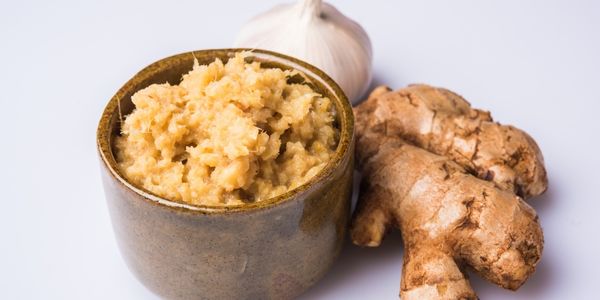
As the names suggest, these are fresh ginger that has been pureed or minced.
Ginger in this form comes preserved in oil, salt, sugar, or all three. This means you might need to adjust the quantity you use according to your taste. Beyond that, these are your best bet if you want to use ginger in a recipe where you can feel it in every bite!
How to Substitute:
Both minced ginger and ginger paste can be used to substitute fresh ginger in a 1:1 ratio. Add more according to your personal preference.
6. Ginger Juice
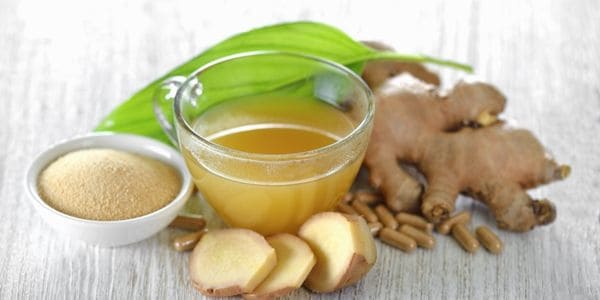
A more situational substitute, ginger juice can substitute fresh ginger in certain dishes.
Ginger juice can help emulate the same distinct flavor of fresh ginger. You can use it in soups, teas, sauces, and so on.
As beneficial as it might be, one can very easily overuse ginger juice, which causes unwanted side effects.
How to Substitute:
One tablespoon of ginger juice can substitute for one inch of fresh ginger.
7. Allspice
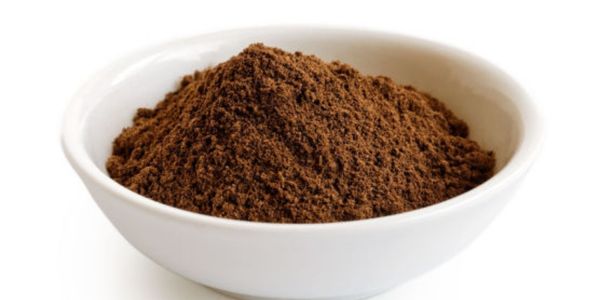
Known as Jamaica pepper for its integral part in many Jamaican dishes, allspice can prove to be a worthy substitute when you want to emulate the same flavor.
Allspice has a balance of sweet as well as spicy, with a minty aftertaste. This gives your recipe a noticeable kick that would have been given by ginger instead. The flavors might be mild, but it resembles the taste of spices like ginger, clove, cinnamon, and nutmeg, making it an ideal substitute.
Although it might not pair with everything like ginger does (for e.g. baking goods), it will enhance the taste of meats, broths, stews, etc. Many American desserts are topped off with a pinch of allspice.
How to Substitute:
¼ – ½ teaspoon of allspice can substitute for 1 tablespoon of fresh ginger.
8. Cinnamon
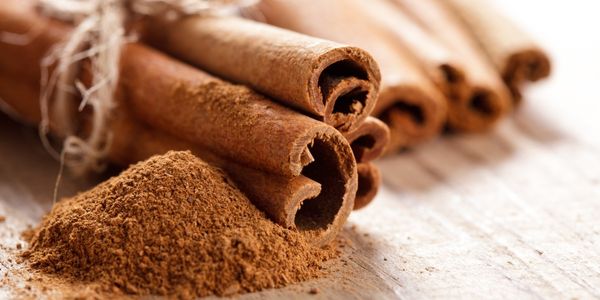
Cinnamon can be described as having a strong fragrant aroma, with a flavor profile that is both warming and a sweet spicy kick. And that’s exactly what makes it a viable substitute for ginger.
Cinnamon has long been used in desserts to “spice” them up. Be it a beverage, cakes, or cinnamon rolls, the taste can certainly open up your senses.
But that’s not all cinnamon can do. You can use cinnamon in savory dishes, just as you would with ginger. Cinnamon pairs well with rice, chicken, lamb, and several Asian cuisines and dishes.
How to Substitute:
¼ teaspoon of cinnamon can substitute for 1 tablespoon of fresh ginger. Add more according to recipe/personal preference.
9. Nutmeg
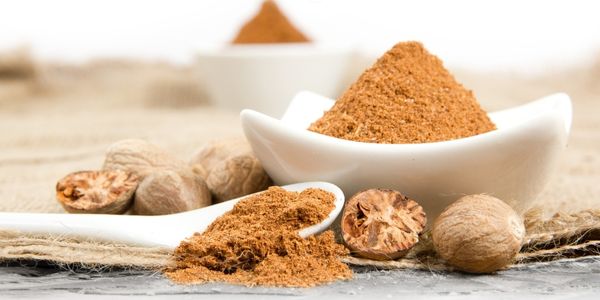
Similar to cinnamon, nutmeg has the same sweet and spicy flavor profile as ginger. Though the sweetness seems to be more prevalent than the spiciness.
Usually found as a whole seed, you can grind them to a powder yourself to add a distinct heat to your dessert, bakeries, or confectionaries.
The spice can be an acquired taste, but pairs excellently with savory dishes such as sausages, pasta, lamb, meats, rice, and eggs.
How to Substitute:
⅛ – ¼ teaspoon of nutmeg can substitute for 1 tablespoon of fresh ginger.
10. Turmeric and Cardamom
Both these spices don’t taste like ginger individually. But when combined, their flavor profiles combine to form an adequate replacement for ginger when you’re in a pinch.
Turmeric has an earthy and slightly bitter note, while cardamom is nutty, citrusy, and extremely aromatic. Their combined flavor profile can be described as warm, nutty, and slightly bitter. With that said, they do lack the spicy zing you might have gotten from ginger. Also, keep in mind that turmeric will give your dish a yellow tint.
How to Substitute:
One teaspoon of turmeric and cardamom in a 1:1 ratio can substitute for one tablespoon of fresh ginger.
11. Mace
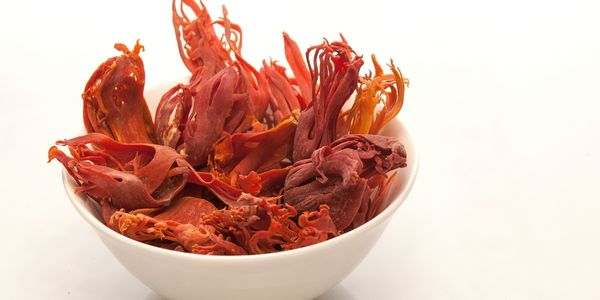
Made from the protective outer coating of nutmeg, mace falls on the sweeter side than the spicy.
Mace has a very similar profile to that of ginger. It is warm, and sweet, with a fragrant aroma and a slightly peppery aftertaste. Its mild flavors make it a great substitute for ginger in baking, but can also be used with meats, sausages, eggs, and various vegetables like carrots and cabbage.
How to Substitute:
¼ teaspoon of mace can substitute for 1 tablespoon of fresh ginger. Add more for savory dishes.
12. Pumpkin Pie Spice
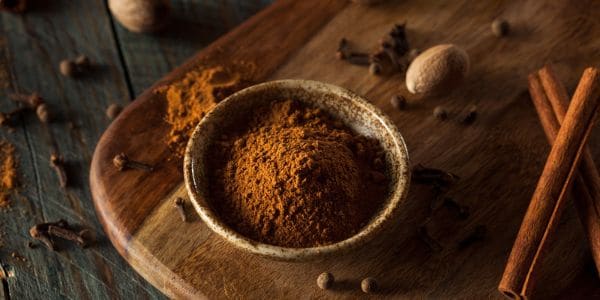
In reference to the last few options, pumpkin pie spice stands out as a distinct choice as it is a blend of several spices.
With notes of cinnamon, nutmeg, ginger, cloves, and allspice, you can tell the complexity this spice can provide for your recipe. Although it works best for baking, you can use this in savory dishes with some restraint and pair it up with hotter spices.
Given its medley of flavors, it can easily replace ginger, if not do more for your dish!
How to Substitute:
1 tablespoon of pumpkin pie spice can substitute for one tablespoon of fresh ginger.
13. Galangal
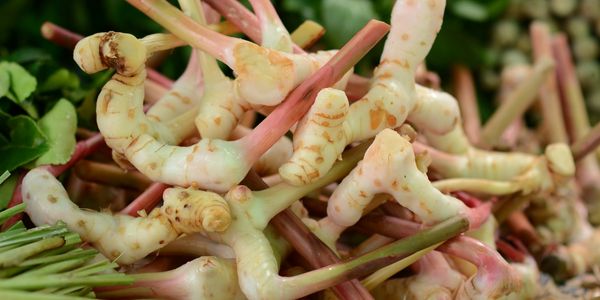
Found mostly in South-East Asian cuisines, galangal can be a perfect ginger substitute based on the dish you’re making.
Compared to ginger, galangal has a similar flavor profile, except it is sharper, spicier, citrusy, and even piney. Some people feel like it’s a combination of turmeric and ginger in terms of taste. You can enhance the dishes that call for citrus or piney notes with galangal, which would not have been possible with ginger.
The only real downside to galangal is how hard it can be to find. Your best option would be to look for it online, or in stores that sell mainly Asian goods.
How to Substitute:
1 – 1 ¼ tablespoon of galangal can substitute for 1 tablespoon of fresh ginger.
14. Ginseng Root
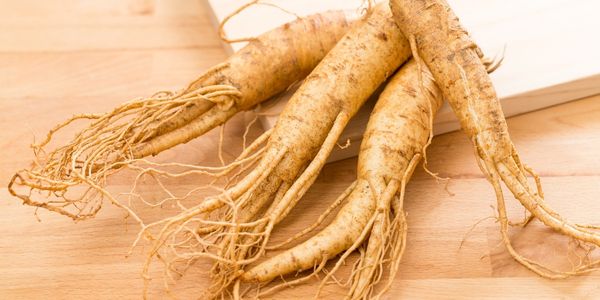
Much like galangal, ginseng root is common in Asian cuisine, especially in Chinese recipes.
Used mainly for its health benefits, ginseng root can sufficiently substitute ginger owing to its flavor profile of sweetness with a slight bitterness. However, ginseng root is slightly milder than ginger for some people.
But if you want an aromatic substitute that does not alter the texture of your dish, then ginseng is an ideal replacement. It adds a noticeable zing to curries, stir-fries, soups, and more.
How to Substitute:
1 tablespoon of ginseng root can substitute for one tablespoon of fresh ginger.
15. Lemongrass
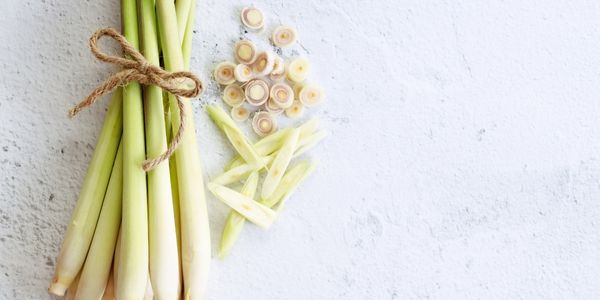
A common ingredient found in most supermarkets, lemongrass will give you the same aromatic kick that you want from ginger, if not stronger!
Lemongrass has a distinct citrusy aroma, with a peppery and slightly minty flavor profile. It has the same intense pungent nature as ginger, making it a great addition to soups, broths, noodles, etc.
It is important to crush the lemongrass stems before you boil or chop them up. This encourages the lemongrass to release some of its oils, giving you a more intense flavor.
How to Substitute:
1 tablespoon of lemongrass can substitute for 1 tablespoon of ginger.
16. Lemon Juice and Garlic
If you happen to be allergic to ginger, then some ingenuity in the kitchen can go a long way!
In a combination of both, you get to mellow out the bite which would have been present with garlic with the acidity of the lemon. This leaves you with a flavor profile almost, if not the same, as ginger. You can even add a bit of black pepper if you want the same kick as ginger.
They can be mixed in a 1:1 ratio, by adding lemon juice to roughly crushed garlic.
How to Substitute:
One tablespoon of lemon juice and garlic mixed in a 1:1 ratio can substitute for one tablespoon of fresh ginger.
17. Lemon Juice, Nuts, and Sugar
As odd as this combination sounds, it is a worthy substitute for ginger when you have no other option when it comes to baking.
The natural sweetness of pecans and walnuts can be grounded together, and mixed with some lemon juice and granulated sugar can ensure you have a sweet, but zesty addition to your baked goods, which ginger would have provided instead.
The acidity from the lemon would cut through the sweetness provided by both nuts and sugar. You can adjust the measurements of these ingredients based on your personal preference. Note that this option won’t have the same kick, and thus should be an absolute last resort.
How to Substitute:
Mix lemon juice, nuts, and sugar in equal parts. 1 ½ tablespoon of this mixture can substitute for 1 tablespoon of fresh ginger.
Conclusion
Ginger is a household staple, depending on the part of the world you’re from. But if you ever run out of ginger, or find that the knob of ginger you’ve been saving in the fridge has gone bad, then no need to panic!
Be it savory or sweet, you now have 17 substitutes for ginger to choose from, if you ever find yourself in that situation!

